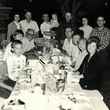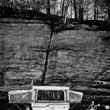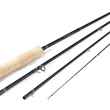One day last fall my wife, Joan, innocently suggested that since we weren’t using the old welded-wire dog crate in the garage—I think she referred to it as “that dog thing”—maybe we could put it out on the curb as a giveaway. We’d done that with the crate’s twin a couple of years ago and it was gone the same afternoon. It’s not as if people cruise our neighborhood night and day looking for stuff to pick up but if you put anything of potential value or utility next to the street it tends not to stay there long. It’s a little mysterious how it happens.
Truth to tell, I couldn’t think of any compelling reason to keep the crate, either. We have more than enough portable dog enclosures for our foreseeable needs, all of them lighter and less bulky than the one in the garage; plus, we’ve been making a concerted effort of late to “lighten the load” and unburden ourselves of things we’re unlikely to have any use for. We’re not getting any younger, as they say.
Still, being agreeable to an idea is not the same as being enthusiastic about it. And I couldn’t expect Joan to understand, or even to imagine, that a beat-up old dog crate shoved against the back wall of the garage might be an object invested with symbolic meaning, much less emotional resonance. But in that crate—a Kennel-Aire No. 136, the model with the slanted front designed specifically to fit in a station wagon—I could see the entire arc of my life as a dog owner and bird hunter.
It had been with me so long, and in so many places, that its physical properties were imprinted on my senses. I could feel its weight, the wire handles pressing into my palms as I lugged it from place to place, trying hard not to bark my shins against its unforgiving bottom edge in the process (and not always succeeding). I could feel the release of tension and hear the slight metallic clatter as I opened the latch and watched my dogs—Zack and Gabe, Emmylou and Traveler, Butch and Ernie—jump up, arrange themselves on the carpet remnants I’d cut for the crate’s bottom, and settle in for the expectant, anticipation-charged ride to wherever our destination might be: Mississippi or Montana, southern Iowa or northern Wisconsin, two hours’ drive or two days’.
How could I explain to Joan that the Kennel-Aire, this graceless cube of welded wire, was in fact a conductor and collector of memories?
I’d purchased identical Kennel-Aires in 1980 when I got my first bird dog puppies, calling the manufacturer in St. Paul to place my order. There was never any question of buying anything else. Kennel-Aire was the state-of-the-art at the time, the crate that all the serious dog men of my acquaintance used and swore by. It was a badge of legitimacy, the secret handshake that marked you as a member of the club. For a wannabe like me, there was something aspirational about it.
More Like This
The quality, of course, was indisputable. Constructed of heavy-gauge electroplated steel wire, the Kennel-Aire was hell-for-stout. Lightweight it wasn’t, and while you could collapse it for storage you gained so little in the bargain that most people didn’t bother.
If anything it was overbuilt, but that’s only to be expected considering the hulking, Detroit-made vehicles of the 1960s and ‘70s it was designed to pair with. I mean, the typical family station wagon of that period was essentially an armored personnel carrier. Opening and closing the rear gates of those beasts was like moving large appliances.
That’s another reason I was reluctant to let the Kennel-Aire go: So palpably a product of that Greatest Generation era, it symbolized a kind of hopefulness, an optimism I felt in those days about what lay ahead, not just in sport but in life. The future was a landscape of limitless horizons and abundant possibilities—and from the beginning of the journey the Kennel-Aire was there, solidly serving its purpose from one vehicle and one occupant to the next, a silent partner through time and space.
It wasn’t just a crate; it was an artifact of my personal history.
Gradually and I suppose inevitably, the Kennel-Aire crate fell out of favor, replaced by molded plastic crates of the basic Vari-Kennel type. They were less expensive, for one thing; they were also lighter and therefore easier to move in and out of vehicles and motel rooms when you were on the road. (Less damaging to shins and door frames, too.) You could disassemble them quickly
and stack them for storage, and if they weren’t as indestructibly sturdy as the Kennel-Aire they were sturdy enough.
They were, as hard as it is for me to admit it, an improvement. The Kennel-Aire was kneeling in the mud to engage the four-wheel-drive lugs by hand; the Vari-Kennel was sitting in the climate-controlled comfort of your SUV and pushing a button. I’d argue, though, that the Kennel-Aire had something that its plastic descendants never will: a little bit of soul.
In the grand scheme of things I was a holdout, stubbornly relying on my battered old Kennel-Aires long past the point that everyone else I knew had put theirs in mothballs. But when Ernie, the last of my dogs who principally rode in one, died in 2013, putting the first Kennel-Aire out on the curb wasn’t a hard call. It was gathering cobwebs in the basement, and I couldn’t imagine a scenario in which we’d ever need two of them again. (And in case anybody’s wondering, the thought of trying to sell it on Craigslist, or wherever, entered my mind only long enough to be dismissed with extreme prejudice.)
Cut to last fall, when Joan asked if we really needed the one we still had. In memory I saw Zack, my old bear of a setter, so conked out in his Kennel-Aire after days of roaming the South Dakota prairies that I had to call his name repeatedly to rouse him—and even then he didn’t move, just cracked a weary eyeball.
“No, I don’t suppose we do,” I said.


























![Instructors John Juracek [left] and Brant Oswald [right] from The School of Trout (photo: Tim Romano). school of trout instructors john juracek brant oswald](https://www.hatchmag.com/sites/default/files/styles/gallery_thumbnail/public/field/image/romano-0024.jpg?itok=X_had7Jf)




Comments
Dave Books replied on Permalink
I still have 3 or 4 of them in my storage shed...I no longer use them but look at them now and then and think I need to re-home them...they do bring back memories. I bought them at the Kennel-Aire store in St. Paul, I think on Snelling Ave., probably in the 1980s. It wasn't much of store...not sure if that's where they were made but I think it was. I had a couple of the cloth covers they made for them too, but those are long gone. Thanks for a trip down memory lane.
Doug replied on Permalink
I still have and use three kennel aires. All bought in the 70s. They were the kennel to have for professionals. Mine have been used in my outfitting business for 50 years and will outlast me. Many good memories.
Anonymous replied on Permalink
Oh, the memories they bring. We had 3, then sold 1 when we got down to 2 German Shepherds. Now we are down to 1 Shepherd and don’t anticipate adding any more. I will be selling 1 more crate but it will fall to those who inherit our worldly goods to decide what to do with that last one that stores more than 50 years of wonderful memories.
Laura replied on Permalink
I still have and use these for my vehicle crates and LOVE them. Currently trying to curb my stalking of FB Marketplace and Craigslist for more since I already have one for each resident dog and a couple "spares".
Gerry Curry replied on Permalink
Thanks so much for the lovely piece. I've owned Kennel-Aire crates since the 70's and still have a #146 in the back of my Subaru as I write this. My Welsh Springer loves to travel in it, as have a great many of my English and Welsh Springers over the years.
Pages